Maggie Beer: ‘I’m not finished yet’
Maggie Beer will soon be 75 — but she says she won’t be retiring anytime soon. Not when she still has to champion better food for Australia’s elderly community.
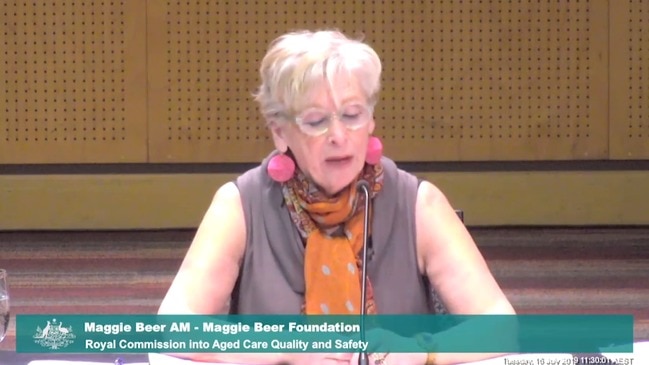
SA Weekend
Don't miss out on the headlines from SA Weekend. Followed categories will be added to My News.
- Culinary queen Maggie Beer refutes claims of retirement
- Maggie Beer sells rest of her food product company for $10m
‘Retirement?” scoffs Maggie Beer in that lovely posh voice that hides the steel beneath. “What’s retiring? I don’t know what retiring is.”
We’re sitting in husband Colin’s office, a few steps through a garden of fresh mint to the Farm Shop and Eatery where Maggie’s fans are filling their bags with verjuice, olive oil, jams and pates.
She dares not show her face there, though, or she’ll never get any work done.
Since the mid-1970s the food legend’s admirers have worn a steady path to her door at Nuriootpa, where the couple boldly decided to follow Colin’s dream of farming pheasants.
The Beers didn’t know a lot about pheasants then, or even if there was a market for them. Colin had just completed his commercial pilot’s licence, Maggie had been everything from forklift driver to assistant to the Chief Geophysicist in Libya.
But they had passion, and confidence.
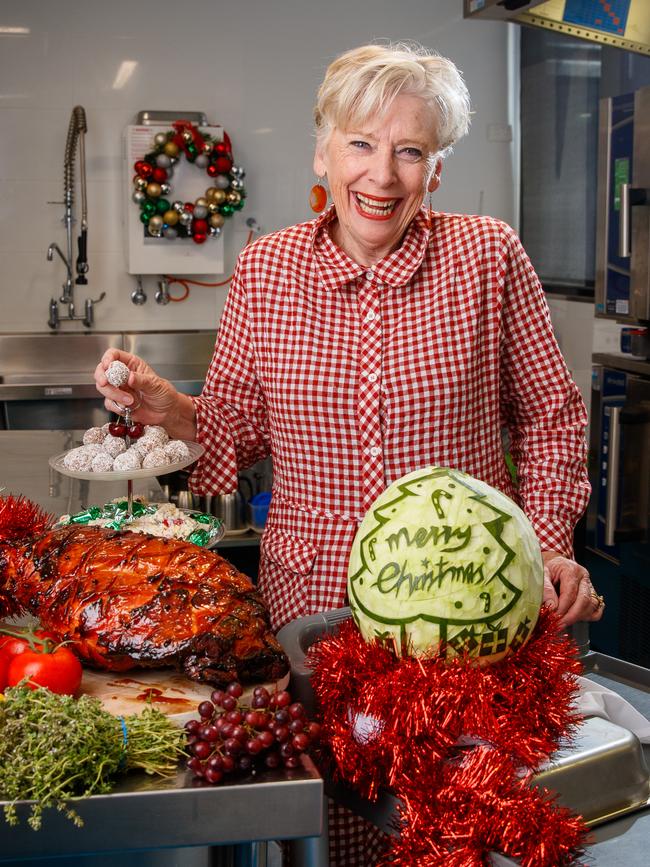
They set up a farm shop to sell their birds, and Maggie showed buyers how to cook them. Disregarding conventional recipes in the cookbook, she followed her instincts. A trend was set.
Success followed in a stellar career with an award-winning restaurant, cookbooks, TV shows and the successful Maggie Beer brands that she and Colin finally sold out of only this year.
Now, about to turn 75 in January – the same weekend as her 50th wedding anniversary – it’s clearly an opportunity to turn down the gas and put work on the back burner. To reflect on a successful life and kick back.
Except that it isn’t.
She is turning up the heat – on the nation’s aged care sector and the way it feeds the 200,000-plus people in almost 2700 homes around Australia.
“While there are good things out there – if you see terrible things, and you’ve got a platform, you’ve got to do something about it,” she says.
Colin’s been booted from his office for a moment so we can talk.
Since the pair met working on the snowfields half a century ago, he’s been his wife’s biggest supporter – and also the one who has the job, tough as it is, to remind her to slow down.
The pair have just returned from a hike with 10 friends around the Izu Peninsula in Japan.
“The most beautiful landscape,” enthuses Maggie, back in her hiking boots for a moment. “Absolutely fantastic coastline, and mountains, and volcanoes, and seven waterfalls in one day.”
It was on another walk, the Camino de Santiago in Spain last year, where the Beers made a big decision.
Maggie decided she needed more “me time” and so they opted to sell out of the company they’d built together, trading their majority share holding to the Longtable Group.
“All of a sudden I want to just be free enough that if we want to go to the beach because the crabs are running, we will do it,” she declared not long afterwards.
So has she caught some yet?
“No,” she confesses.
“But we were going, and the wind came up – but that is the big thing I’m working at. And in fact we did do a midweek trip to the beach – that, you know, is a real big thing.”
It’s clearly proved tough. So in Japan, she and Colin reminded themselves they needed to plan their lives so they could “actually be free enough”.
The thing is, she says, there’s a more important claim on her time – her campaign to fight for better meals in the nation’s aged care homes. The elderly are too often fed unappetising food made with inadequate budgets.
“It’s a topic of the moment,” she says, “and I have to run with it right now because we’ve been running with it for a long time.”

Thanks to the national hearings of the Royal Commission into Aged Care Quality and Safety, there’s a whole new focus on a problem that Maggie has been trying to fix since establishing her Foundation in 2014.
The commission has been told some homes spend just $6-$7 a day on food for each resident. Maggie says that is too little. “They would have to use processed food, frozen food, frozen vegetables, fish that is usually frozen and imported, not even Australian,” she told the commission.
If the cooking skills and culture were right, it might be possible to feed residents for as little as $10.50 a day but for $14 a person “you can do really good food giving more choice,” Maggie says.
Yet, says one Australian study, the average of $6.08 is even less than the $8.25 spent in prisons.
For Maggie, food is the key to ensuring ageing people can thrive.
Nutritious food that looks and smells appetising not only brings pleasure, but the energy and strength to live well. “There is no room for institutionalised food,” she says.
Maggie is a prime example of the nation’s outdated perception of ageing. Articulate, driven, and – at 74 – older than some of the people in aged care, she personifies the potential of “older” Australians. She’s not just fit and healthy enough for regular treks, but brimming with new ideas and plans.
There’s an idea for a new TV show involving music and food, still under wraps and looking for funding. She’s kept her hand in with her business by staying on as a director of Longtable, developing new products for the company, and playing the role of brand ambassador. And she and Colin still run the Farm Shop and have a stake in daughter Elli’s Eatery, a seven day a week operation.
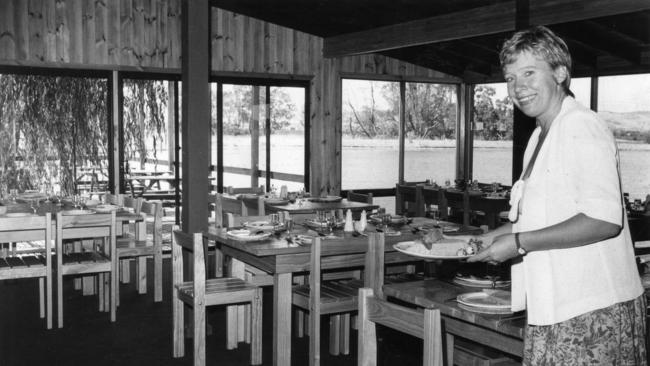
But her energies are now increasingly shared with the work of her foundation and properly feeding the aged.
This project began by accident in 2010, the year she was named Senior Australian of the Year. “It was really simple,” she recalls.
“Having had 900 requests that year I was deciding which ones I could do. And one was to address 1000 CEOs of aged care and so I did the research and I went to aged care homes, Meals on Wheels, council outfits, and I saw great things and terrible things. If you see terrible things and you’ve got a platform you’ve got to do something about it. So that started it.”
Her speech was not well-received. “It wasn’t a particularly successful speech,” she admits. “A lot of them, were … I felt an anger.”
It wasn’t all bad. Far from it. “The good stuff was so good and it was so obvious it could be done properly,” she says. “The bad stuff was just … even the smells of the food, let alone eating it. I could see what a huge gap there was and how it was unconscionable that it be left like that.”
She believed some bosses didn’t know what they were doing was bad, and others did. Maggie didn’t favour confrontation. “Basically human nature is such that most people want to do it well if they know how – and so everything I’ve tried to do is from a positive base not a negative base.”
Despite a cool reception, within a couple of months Maggie was contacted by a couple of the bosses, one in Noosa and the other Sydney, who wanted to do better. One had completely changed the way her company did things immediately, and the other, HammondCare in NSW, asked her to visit to discuss how to make changes.
Maggie felt energised. She could see there were some who agreed there was a problem. But they needed to be shown how to fix it. Her idea was set up a foundation, and by 2014 it was up and running.
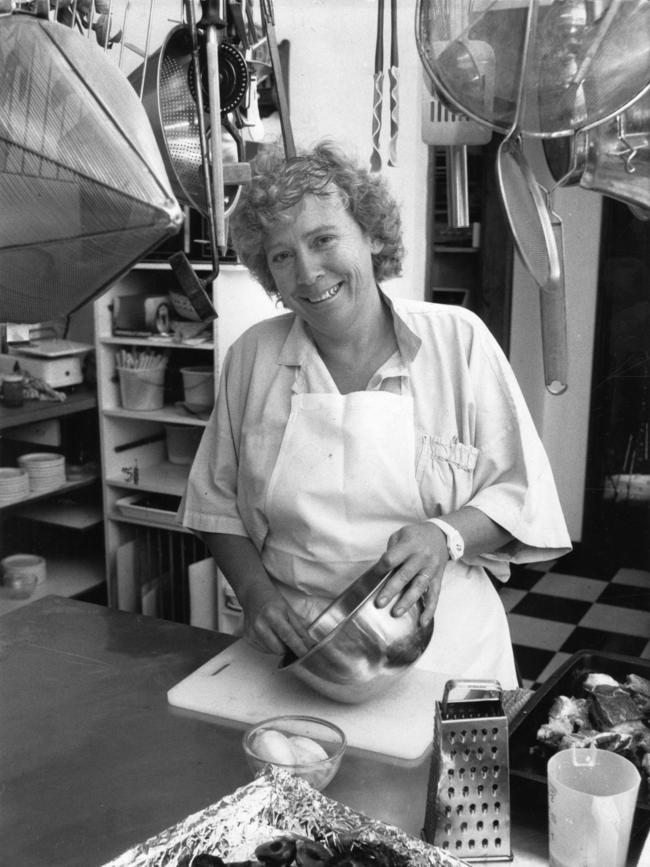
One of the first moves was working with her friend Simon Bryant from The Cook and the Chef, to develop a course for TAFE where cooks and chefs who worked in the sector could learn how to prepare food well, economically, for the special needs of older people. “We virtually put it on a platter,” she says. “But it was a bad time for TAFE.”
So Maggie did it herself, running her own three-day masterclasses, several times a year in different states, where 30 chefs and cooks from aged care homes come to be educated and inspired. On day three, the CEOs are brought in.
“We’re just giving kudos and inspiration, and making cooks and chefs understand they are the most important people for changing the life of those they are looking after,” she says. “Afterwards, everyone is kept in a network where they share recipes, and keep learning from each other.”
The problem for many of the cooks is they haven’t been seen as a well-respected part of their team, nor has there been specific training for the special needs of the people they are serving.
“It’s really difficult,” she says.
“It’s not just like being a cook or a chef in a cafe. They have these different diets, people with dysphagia who can’t swallow; it’s very complex and so often they’re without the resources they need in skills and labour. It’s about giving them a whole pile of energy, and skills and ideas, and the respect we have that they are very important.”
She points out it can be cheaper and quicker to make food from scratch rather than use a packet, citing chocolate mousse as one example.
Even when the big homes have food cooked elsewhere and then delivered for reheating, it’s possible to make the food appetising, she says.
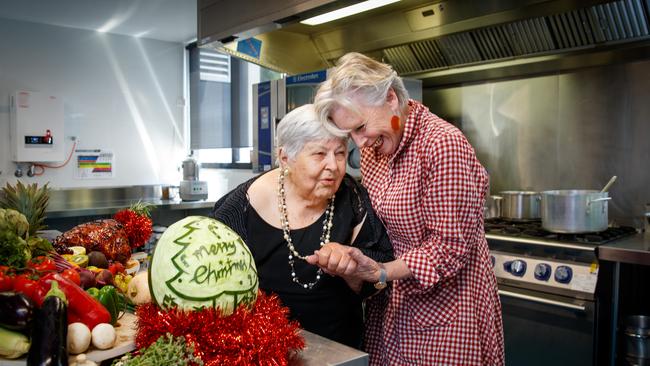
“It’s about making use of what’s in season and making the most of things that are in plenty … things like making the soup during the week will make it even better by the weekend,” Maggie says.
“Everything is about being flavour driven, and nutrition side-by-side. Because no matter how much nutrition there might be in food, if there’s no flavour and pleasure they’re not going to eat it. And also if there aren’t the scents of home cooking, then as we get older our saliva diminishes and that’s needed for the digestion but also the awakening of the senses that you’re hungry.”
That’s why she suggests even when food is delivered, last moment touches, such as frying off onions, can make all the difference to whether the food is eaten.
And without the right nutrients, protein, calcium particularly, the resident won’t have the muscle mass to be involved in anything, she says. “If it doesn’t smell and taste good – if it’s not full of flavour and pleasure – the waste of food is huge.”
As well, residents shouldn’t be treated like children. Mentally engage them, encourage them to set the table, grow things in the garden. “Without a doubt ageism has to change,” she says. “There is a change happening – in people of my age who are going to be as involved in life to the end of their life, it is a larger percentage now. That will turn the tide and Baby Boomers, younger than me, who’ve changed lives all their lives, they will demand more. But there will always be this percentage we will really need to look after.”
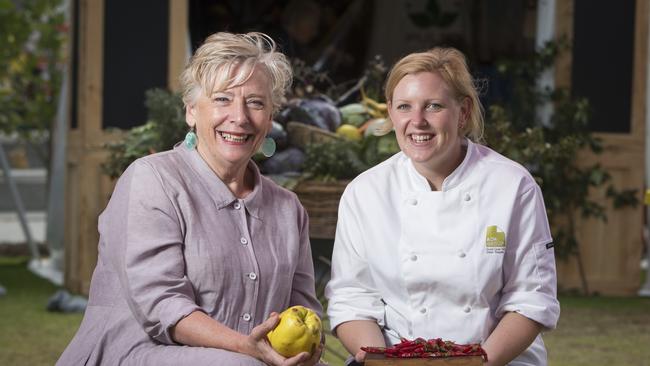
So 2020 doesn’t seem to be shaping as one with plenty of time for crabbing.
“A huge year,” Maggie admits.
But, mindful of the need to make that time when she can – and celebrate a few milestones – the Beers are off to Noosa in January to celebrate their 50th anniversary and, two days later, her 75th birthday, with the entire clan of daughters and grandkids.
“We’re not going out to restaurants,” she says.
“We’ve taken two houses and we’re going to bring in this beautiful food and cook. It will be hot but there’s a swimming pool and the beach.”
Then, in February, filming starts on the first of a planned 45 units over three years of a series using the Maggie Beer brand aimed at educating cooks and chefs on ways to cook for older Australians.
It’s like a TV show, she says, and the first 11 units (all that is currently funded by a federal grant) include specific elements on food for those with dysphagia and also for remote Aboriginal communities.
Simon Bryant is on board for a couple of episodes, just like old times.
“The teaching’s got to be exciting or it’s not going to work,” she says. To make sure it is, she’ll be drawing on lots of experience from her TV shows, whether it’s The Cook and the Chef or The Great Australian Bake Off.
The secret is to be genuine, she says.
“The one thing I learned about TV very early on is ‘I am what I am’. Simon and I, when we work together for four years of Cook and the Chef … he didn’t know what I was cooking and I didn’t know what he was cooking … and so it was all off the cuff, never repeated and I’ve never been aware there’s a camera there, because you’re involved. That’s what’s worked.”
Maggie also intends taking up as many speaking engagements as she can manage with corporate Australia, which pays well to hear her wisdom. That money will go into the Foundation, to fund the campaign.
Still, she accepts she has to step back a bit. She’s on the board of Longtable until at least April 2021, as well as the brand ambassador. And she loves that. Having no association with the products under her name would be unthinkable.
“I started it from scratch,” she tells me. “It would be like cutting off my arm.”
But she doesn’t need to be managing so intensely the running of the Farm Shop, the eatery and their farm, so she is moving someone into a management role so she can step back. “I just have to find my way of letting go of the things I can let go. It’s always been a challenge. I’m excited by ideas and being able to make things happen.”
Meanwhile, Colin is keeping an eye on things. He knows when she’s taking on too much. In 1991, when their Pheasant Farm restaurant won the Remy Martin Cognac – Australian Gourmet Traveller Restaurant of the Year, diners were suddenly arriving in helicopters and the restaurant was always full.
“It burnt me out, because I’m obsessive, and I wouldn’t leave the stove,” Maggie told me earlier this year for a new book, co-authored with Carolyn Collins, Trailblazers, 100 Inspiring South Australian Women.
“And Colin came in one day and said, ‘It’s the restaurant or me’.”
But it’s that passion that has made Maggie Beer what she is. And now it’s directed at a better deal for older Australians, whose lives could be changed enormously by something as simple as better food.
So is Colin happy? “He did say on Sunday, ‘Now you’re not going to let this overtake – remember, remember’. But he does know that right now is this critical time of making the most of both the public and the bureaucrats understanding that we have to change.
“The royal commission has been a bit of a bombshell. Now things are so topical … I’m not going to let the opportunity to be on the front foot go.”
